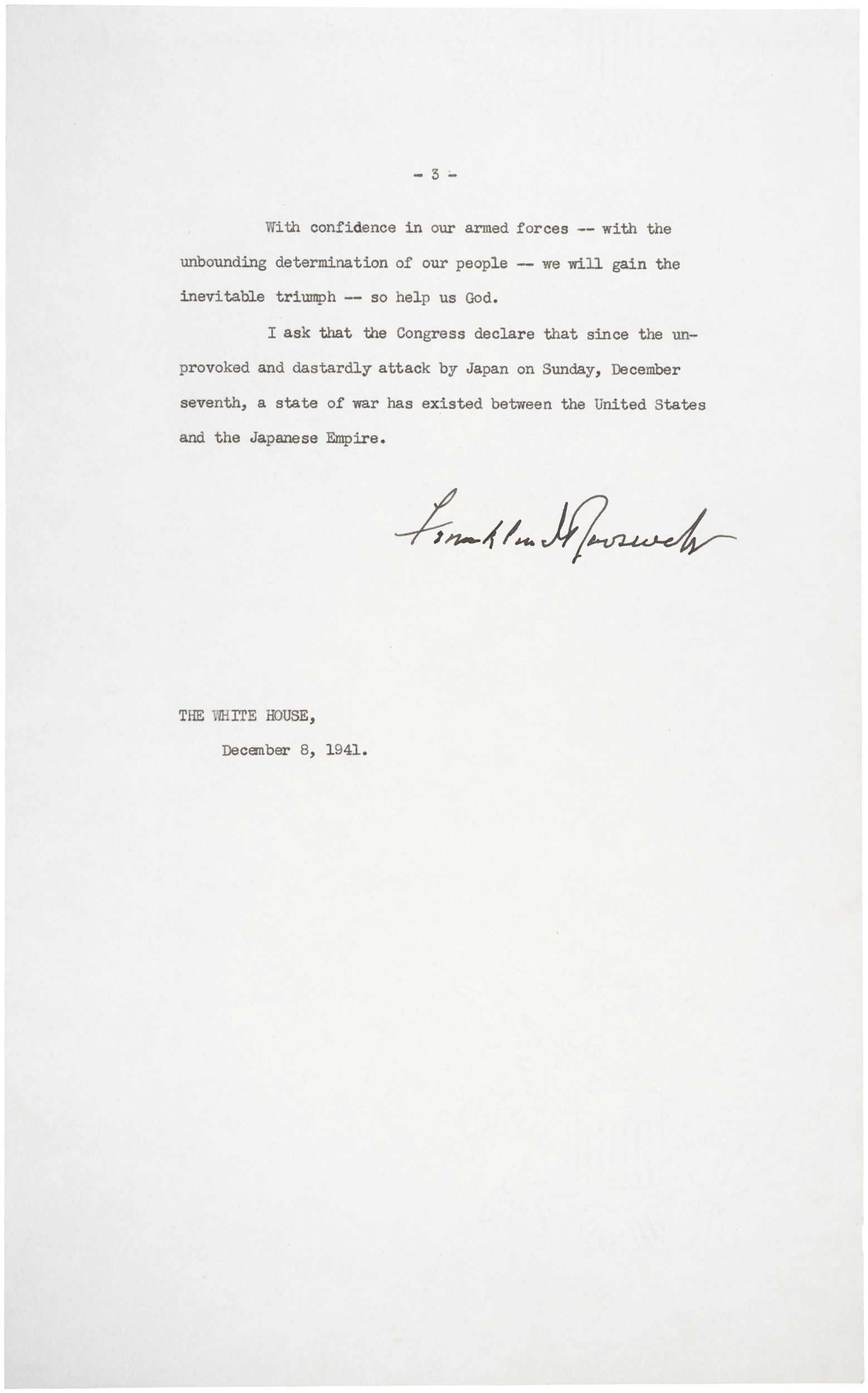'A Date Which Will Live In ___________'
Focusing on Details: Compare and Contrast
All documents and text associated with this activity are printed below, followed by a worksheet for student responses.Introduction
On the evening of December 7th, 1941, following meetings with his military advisers, President Franklin D. Roosevelt dictated to his secretary a request to Congress for a declaration of war. He had composed the speech in his head after deciding on a brief, uncomplicated appeal to the people of the United States.President Roosevelt then revised the typed draft—marking it up, updating details, and altering some words to change the speech’s tone. Final copies were prepared, then Roosevelt altered the speech in three more places. On December 8, Roosevelt addressed a joint session of Congress and the nation via radio.
Read, analyze and contrast the typewritten draft and the final copy.
Name:
Class:
Class:
Worksheet
'A Date Which Will Live In ___________'
Focusing on Details: Compare and Contrast
Examine the documents included in this activity and write your response in the space provided.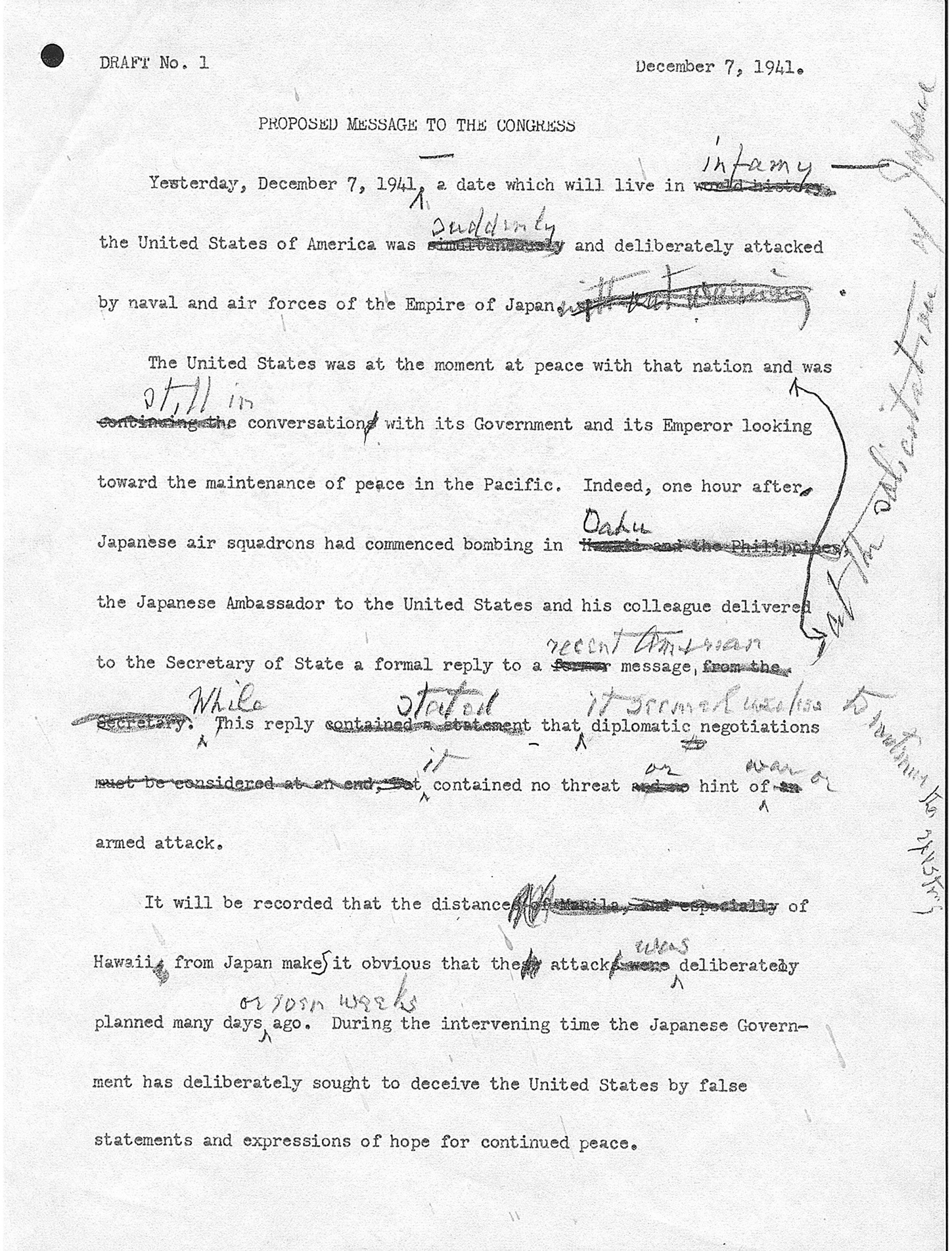
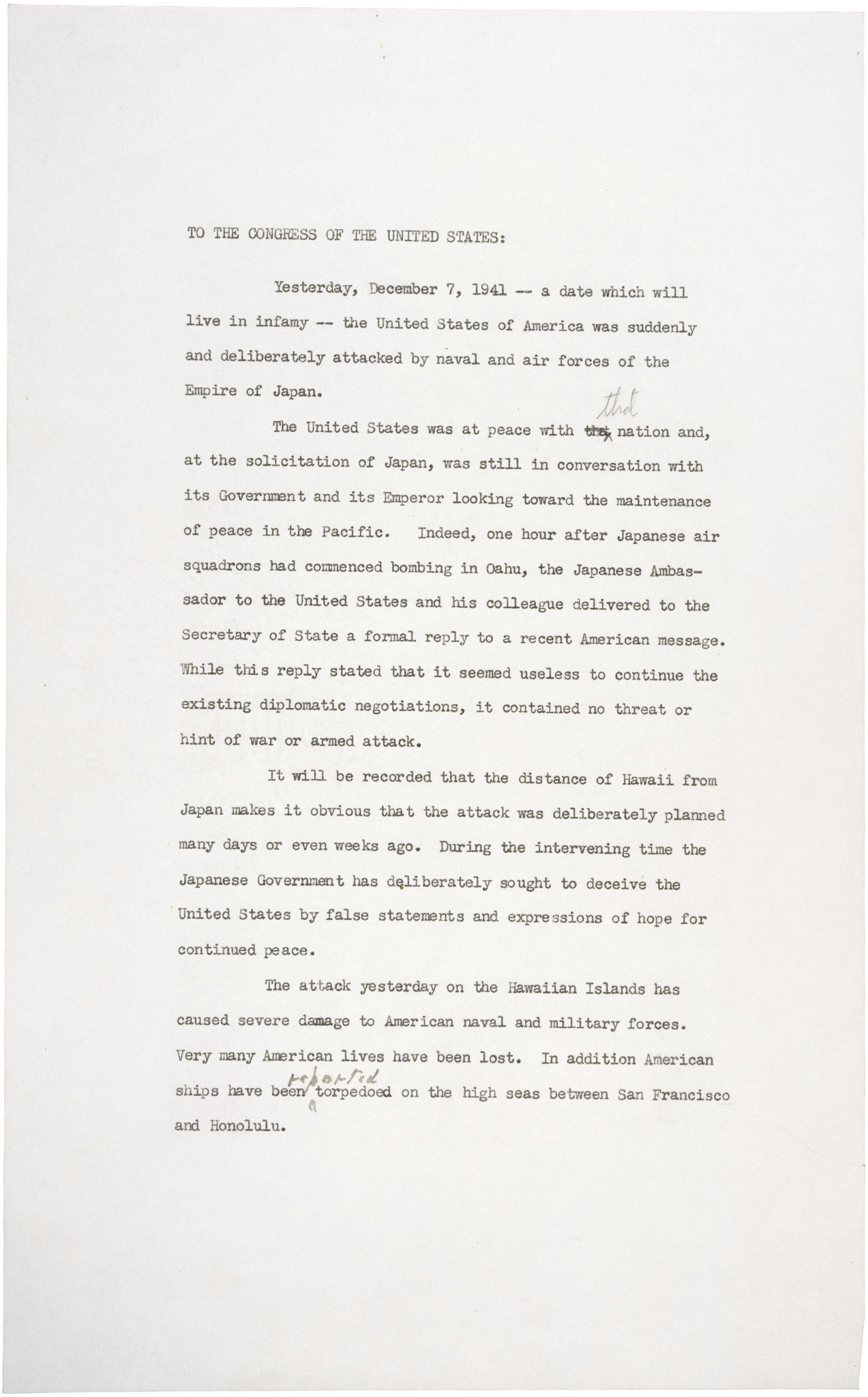
Read, analyze and contrast the typewritten draft and the final reading copy. Cite specific textual evidence to support your opinion.
- What was the purpose of the speech?
- What evidence does FDR provide to support his argument?
- Describe the structure of FDR's speech. How is information presented?
Your Response
1
Activity Element
Page 1

2
Activity Element
Page 1

Conclusion
'A Date Which Will Live In ___________'
Focusing on Details: Compare and Contrast
- In your opinion, what are the three most important changes that Roosevelt made between his typewritten draft and the final copy?
- How did these changes impact the overall meaning and tone of the speech?
Your Response
Document
Annotated Draft of Proposed Message to Congress Requesting Declaration of War Against Japan
12/7/1941
After Pearl Harbor was bombed on December 7, 1941, President Franklin D. Roosevelt appeared before Congress and asked for a declaration of war against Japan. This is his annotated draft of the speech.
The speech was dictated by Roosevelt on December 7, 1941, in the hours following the Japanese attack on Pearl Harbor. The handwritten notations are Roosevelt's modifications and corrections to the typewritten first draft. The final version of the speech incorporating Roosevelt's annotations was delivered by the President to a Joint Session of Congress on December 8, 1941.
The speech was dictated by Roosevelt on December 7, 1941, in the hours following the Japanese attack on Pearl Harbor. The handwritten notations are Roosevelt's modifications and corrections to the typewritten first draft. The final version of the speech incorporating Roosevelt's annotations was delivered by the President to a Joint Session of Congress on December 8, 1941.
This primary source comes from the Collection FDR-FDRMSF: Franklin D. Roosevelt Master Speech Files.
National Archives Identifier: 593345
Full Citation: Annotated Draft of Proposed Message to Congress Requesting Declaration of War Against Japan; 12/7/1941; Franklin D. Roosevelt Master Speech Files, 1/19/1898 - 4/13/1945; Collection FDR-FDRMSF: Franklin D. Roosevelt Master Speech Files, ; Franklin D. Roosevelt Library, Hyde Park, NY. [Online Version, https://docsteach.org/documents/document/annotated-draft-requesting-war-against-japan, April 24, 2024]Annotated Draft of Proposed Message to Congress Requesting Declaration of War Against Japan
Page 1

Annotated Draft of Proposed Message to Congress Requesting Declaration of War Against Japan
Page 2
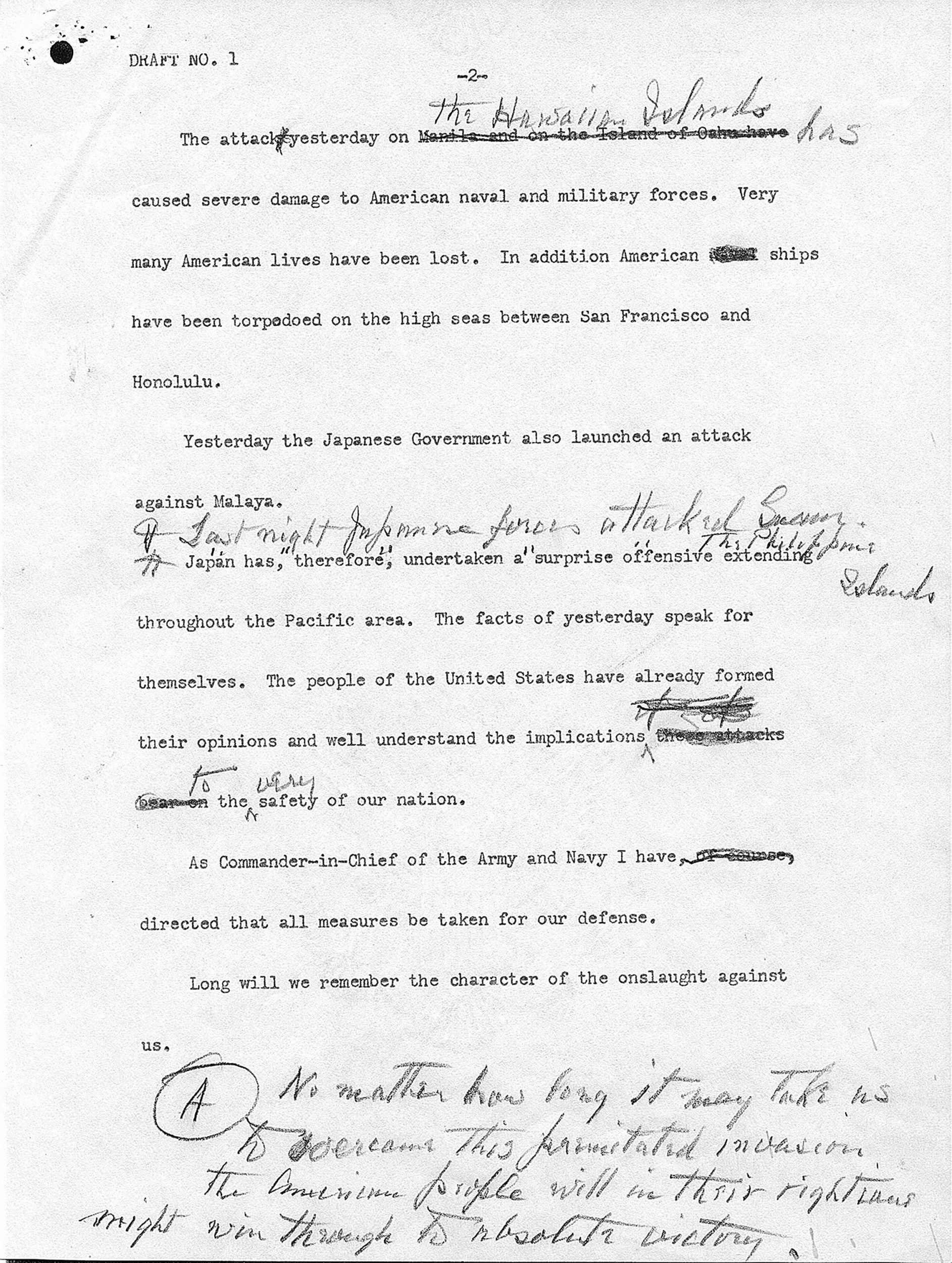
Annotated Draft of Proposed Message to Congress Requesting Declaration of War Against Japan
Page 3
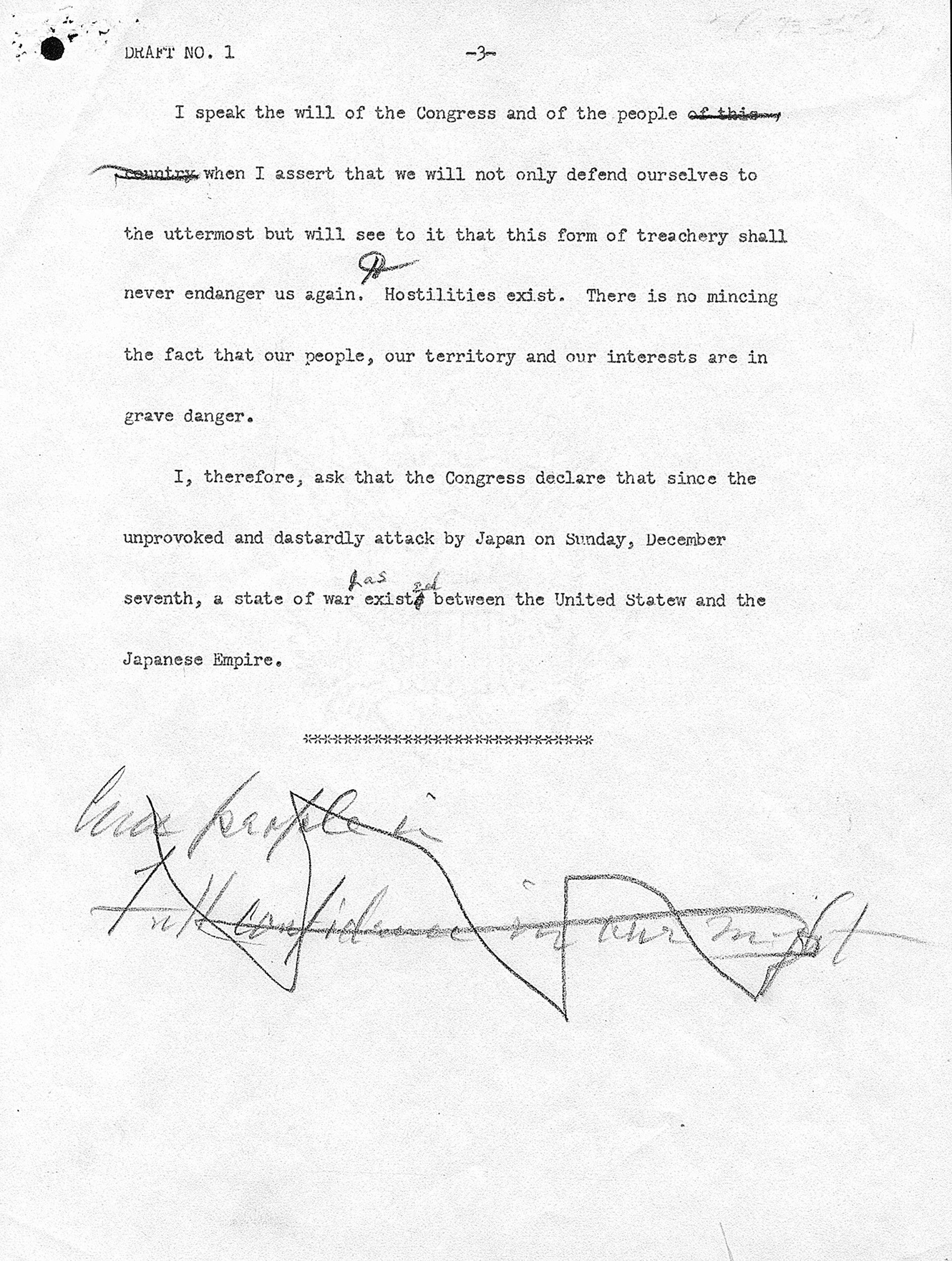
Document
President Franklin D. Roosevelt's Day of Infamy Speech [Joint Address to Congress Leading to a Declaration of War Against Japan]
12/8/1941
President Franklin D. Roosevelt delivered this joint address to Congress on December 8, 1941, the day after the Japanese attacked Pearl Harbor. This is the official copy of FDR's speech presented to the Senate.
His famous “Day of Infamy” speech was a call to arms. He expressed outrage at Japan and confidence in the “inevitable triumph” of the United States. Roosevelt concluded by asking Congress to declare that a state of war existed between the United States and Japan. Immediately afterward, Congress declared war, and the United States entered World War II.
On December 7, 1941, the U.S. naval base on the island of Oahu, Hawaii, had been subject to an attack that was one of the greatest military surprises in the history of warfare. In less than two hours, the U.S. Pacific Fleet was devastated, and more than 3,500 Americans were killed or wounded. The Japanese attack on Pearl Harbor catapulted the United States into World War II.
The American people were outraged. Though diplomatic relations between the United States and Japan were deteriorating, they had not yet broken off at the time of the attack. Instantly, the incident united the American people in a massive mobilization for war and strengthened American resolve to guard against any future lapse of military alertness.
Early in the afternoon of December 7, 1941, President Franklin D. Roosevelt and his chief foreign policy aide, Harry Hopkins, were interrupted by a telephone call from Secretary of War Henry Stimson and told that the Japanese had attacked Pearl Harbor. At about 5 p.m., following meetings with his military advisers, the President calmly and decisively dictated to his secretary, Grace Tully, a request to Congress for a declaration of war. He had composed the speech in his head after deciding on a brief, uncomplicated appeal to the people of the United States rather than a thorough recitation of Japanese treachery, as Secretary of State Cordell Hull had urged.
President Roosevelt then revised the typed draft—marking it up, updating military information, and selecting alternative wordings that strengthened the tone of the speech. He made the most significant change in the critical first line, which originally read, "a date which will live in world history." Grace Tully then prepared the final reading copy, which Roosevelt subsequently altered in three more places.
On December 8, at 12:30 p.m., Roosevelt addressed a joint session of Congress and the American people via radio. The Senate responded with a unanimous vote in support of war; only Montana pacifist Jeanette Rankin dissented in the House. At 4 p.m. that same afternoon, President Roosevelt signed the declaration of war.
His famous “Day of Infamy” speech was a call to arms. He expressed outrage at Japan and confidence in the “inevitable triumph” of the United States. Roosevelt concluded by asking Congress to declare that a state of war existed between the United States and Japan. Immediately afterward, Congress declared war, and the United States entered World War II.
On December 7, 1941, the U.S. naval base on the island of Oahu, Hawaii, had been subject to an attack that was one of the greatest military surprises in the history of warfare. In less than two hours, the U.S. Pacific Fleet was devastated, and more than 3,500 Americans were killed or wounded. The Japanese attack on Pearl Harbor catapulted the United States into World War II.
The American people were outraged. Though diplomatic relations between the United States and Japan were deteriorating, they had not yet broken off at the time of the attack. Instantly, the incident united the American people in a massive mobilization for war and strengthened American resolve to guard against any future lapse of military alertness.
Early in the afternoon of December 7, 1941, President Franklin D. Roosevelt and his chief foreign policy aide, Harry Hopkins, were interrupted by a telephone call from Secretary of War Henry Stimson and told that the Japanese had attacked Pearl Harbor. At about 5 p.m., following meetings with his military advisers, the President calmly and decisively dictated to his secretary, Grace Tully, a request to Congress for a declaration of war. He had composed the speech in his head after deciding on a brief, uncomplicated appeal to the people of the United States rather than a thorough recitation of Japanese treachery, as Secretary of State Cordell Hull had urged.
President Roosevelt then revised the typed draft—marking it up, updating military information, and selecting alternative wordings that strengthened the tone of the speech. He made the most significant change in the critical first line, which originally read, "a date which will live in world history." Grace Tully then prepared the final reading copy, which Roosevelt subsequently altered in three more places.
On December 8, at 12:30 p.m., Roosevelt addressed a joint session of Congress and the American people via radio. The Senate responded with a unanimous vote in support of war; only Montana pacifist Jeanette Rankin dissented in the House. At 4 p.m. that same afternoon, President Roosevelt signed the declaration of war.
Transcript
TO THE CONGRESS OF THE UNITED STATES:Yesterday, December 7, 1941—a date which will live in infamy—the United States of America was suddenly and deliberately attacked by naval and air forces of the Empire of Japan.
The United States was at peace with that Nation and, at the solicitation of Japan, was still in conversation with its Government and its Emperor looking toward the maintenance of peace in the Pacific. Indeed, one hour after Japanese air squadrons had commenced bombing in the American Island of Oahu, the Japanese Ambassador to the United States and his colleague delivered to our Secretary of State a formal reply to a recent American message. And while this reply stated that it seemed useless to continue the existing diplomatic negotiations, it contained no threat or hint of war or of armed attack.
It will be recorded that the distance of Hawaii from Japan makes it obvious that the attack was deliberately planned many days or even weeks ago. During the intervening time the Japanese Government has deliberately sought to deceive the United States by false statements and expressions of hope for continued peace.
The attack yesterday on the Hawaiian Islands has caused severe damage to American naval and military forces. I regret to tell you that very many American lives have been lost. In addition American ships have been reported torpedoed on the high seas between San Francisco and Honolulu.
Yesterday the Japanese Government also launched an attack against Malaya.
Last night Japanese forces attacked Hong Kong.
Last night Japanese forces attacked Guam.
Last night Japanese forces attacked the Philippine Islands.
Last night the Japanese attacked Wake Island. And this morning the Japanese attacked Midway Island.
Japan has, therefore, undertaken a surprise offensive extending throughout the Pacific area. The facts of yesterday and today speak for themselves. The people of the United States have already formed their opinions and well understand the implications to the very life and safety of our Nation.
As Commander in Chief of the Army and Navy I have directed that all measures be taken for our defense.
But always will our whole Nation remember the character of the onslaught against us.
No matter how long it may take us to overcome this premeditated invasion, the American people in their righteous might will win through to absolute victory. I believe that I interpret the will of the Congress and of the people when I assert that we will not only defend ourselves to the uttermost but will make it very certain that this form of treachery shall never again endanger us.
Hostilities exist. There is no blinking at the fact that our people, our territory, and our interests are in grave danger.
With confidence in our armed forces—with the unbounding determination of our people—we will gain the inevitable triumph- so help us God.
I ask that the Congress declare that since the unprovoked and dastardly attack by Japan on Sunday, December 7, 1941, a state of war has existed between the United States and the Japanese Empire.
Franklin D. Roosevelt
The White House,
December 8, 1941
This primary source comes from the Records of the U.S. Senate.
National Archives Identifier: 595426
Full Citation: President Franklin D. Roosevelt's Day of Infamy Speech [Joint Address to Congress Leading to a Declaration of War Against Japan]; 12/8/1941; Messages, Reports, and Communications Tabled or Read, 1875 - 1968; Records of the U.S. Senate, ; National Archives Building, Washington, DC. [Online Version, https://docsteach.org/documents/document/day-of-infamy-speech, April 24, 2024]President Franklin D. Roosevelt's Day of Infamy Speech [Joint Address to Congress Leading to a Declaration of War Against Japan]
Page 1
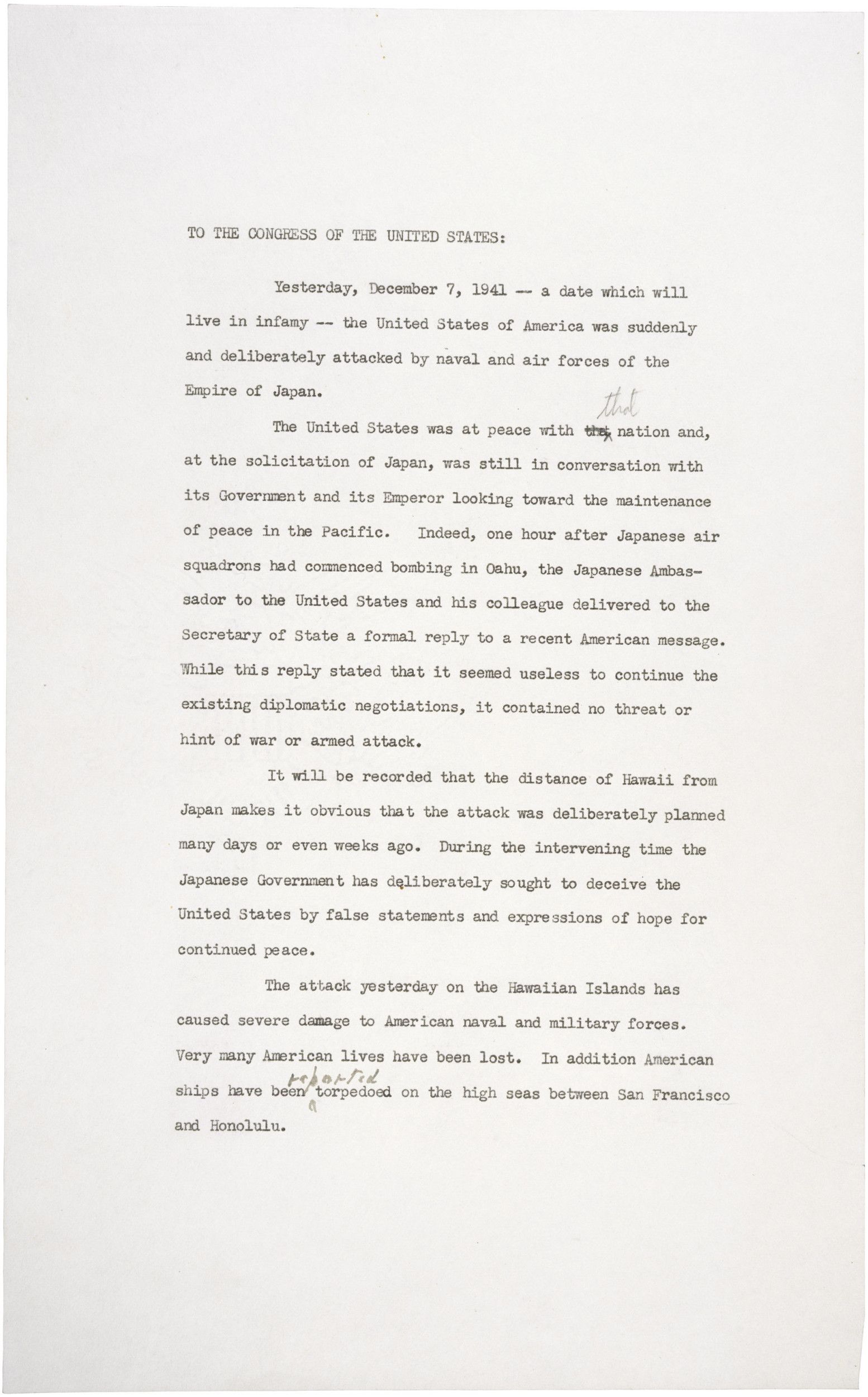
President Franklin D. Roosevelt's Day of Infamy Speech [Joint Address to Congress Leading to a Declaration of War Against Japan]
Page 2
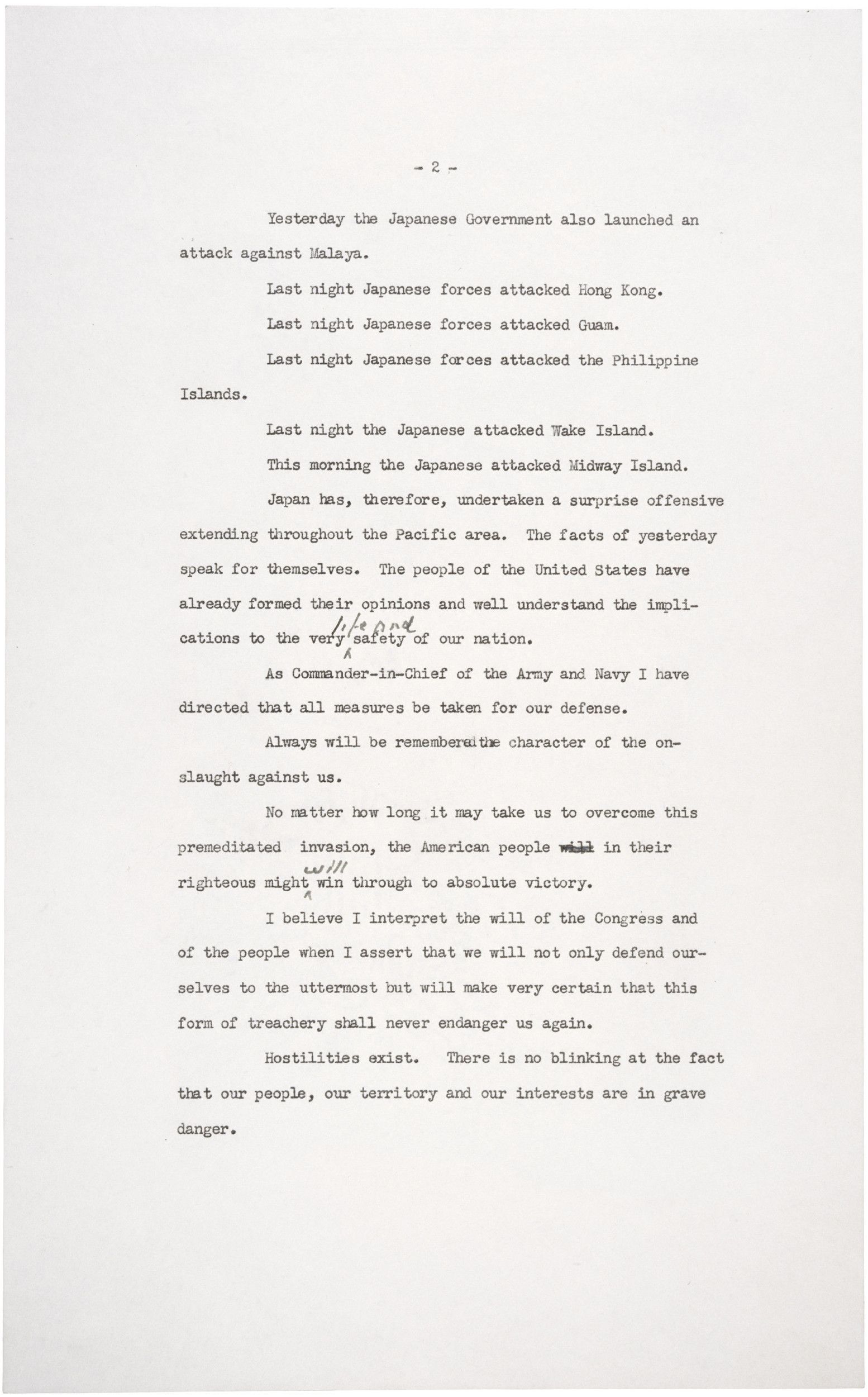
President Franklin D. Roosevelt's Day of Infamy Speech [Joint Address to Congress Leading to a Declaration of War Against Japan]
Page 3
